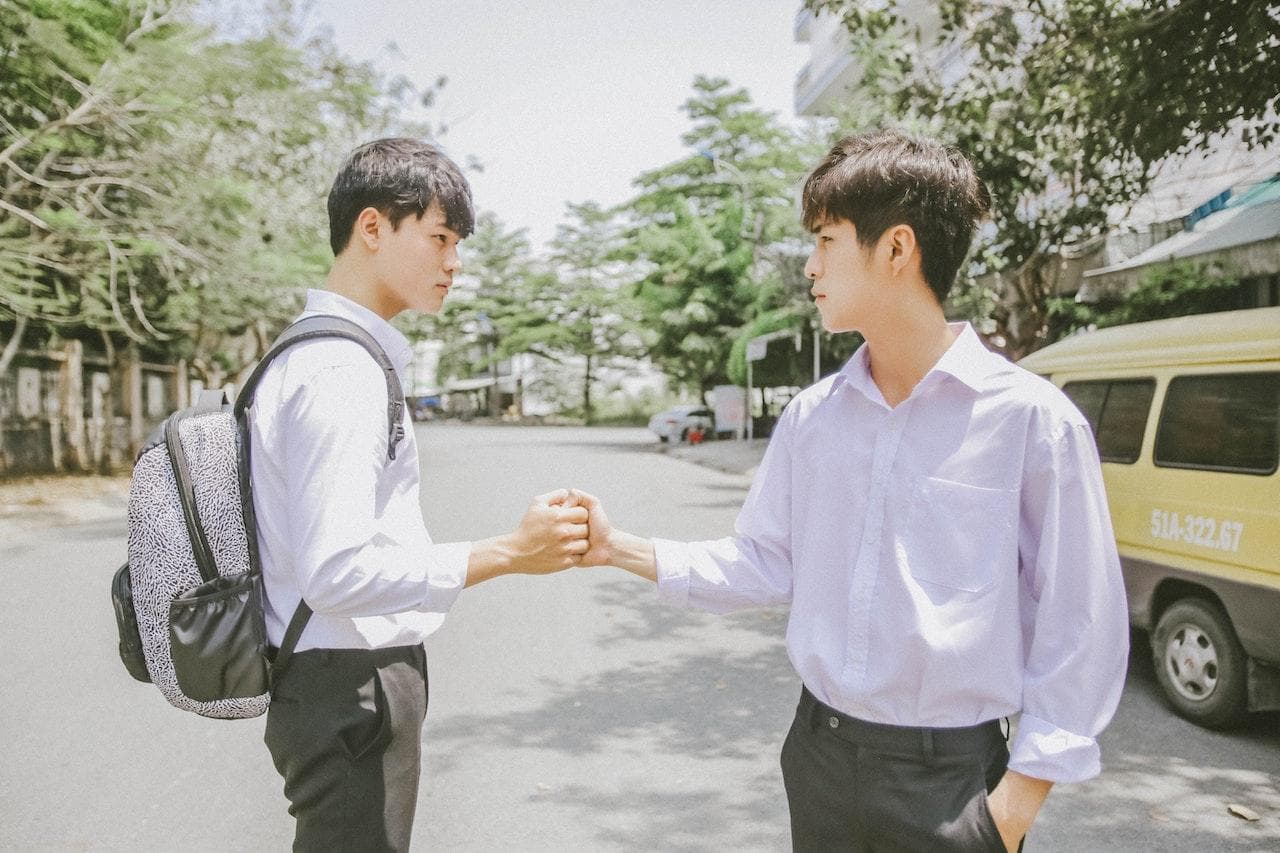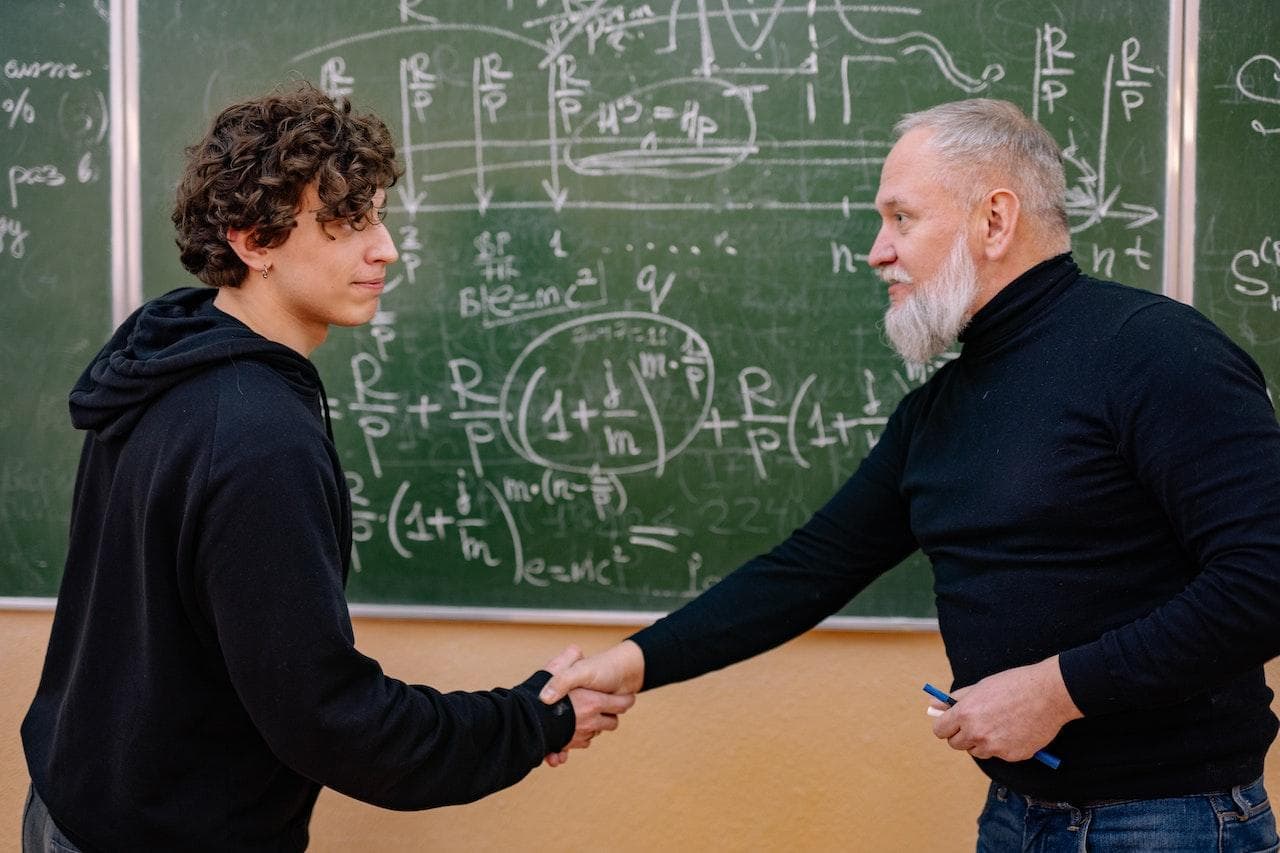"Nice to meet you" is a common phrase that is used when meeting someone new. It is an important phrase when we engage in conversations and try to make new friends. It's especially useful if we want to practice our spoken language in real conversations.
So how do we say "Nice to meet you" in Chinese?
This article introduces various useful phrases to use when meeting someone for the first time in different scenarios.
很高兴认识你 (hěn gāo xìng rèn shí nǐ)

This is the most direct Chinese translation of "nice to meet you" and is commonly used in daily life.
This phrase can be broken down into two parts: "很高兴" (hěn gāo xìng) and "认识你" (rèn shí nǐ). "很高兴" means "very happy", while "认识你" means "to know you".
It is a polite and friendly way to greet someone when you meet them for the first time. You can use this phrase in any situation where you want to express your pleasure at meeting someone new, such as when you are introduced to a colleague, a friend, or a new acquaintance.
Here are some examples using "很高兴认识你":
Example 1:
A: 你好,我是小明。 - Hello, I am Xiao Ming.
B: 你好,很高兴认识你,我是小红。 - Nice to meet you, I am Xiao Hong.
Example 2:
A: 你是新来的同事吗? - Are you a new colleague here?
B: 是的,你好。我叫张琳。 - Yes, hello. My name is Zhang Lin.
A: 很高兴认识你,我是王伟。 - Nice to meet you, I am Wang Wei.
Example 3:
A: 你从哪里来? - Where are you from?
B: 我来自美国。 - I am from the United States.
A: 很高兴认识你,我是李华。 - Nice to meet you, I am Li Hua.
Overall, "很高兴认识你" is a commonly used phrase to say "Nice to meet you" in Chinese. It is a polite and friendly way to greet someone for the first time in both formal and informal situations.
见到你很高兴 (jiàn dào nǐ hěn gāo xìng)

This is a very similar phrase to the one above. But pay attention that it means "I'm very happy to see you"/"Nice to see you". It is a phrase used to express happiness upon seeing someone, whether it's the first time or not.
Here are some example conversations using this phrase:
1. Meeting an old friend after a long time:
A: 哇,好久不见了! 你现在在做什么呢?
Wow, long time no see! What are you up to these days?
B: 我在读研,刚刚忙完期末考试。见到你很高兴!
I'm studying for my master's degree and just finished my final exams. Nice to see you!
2. Meeting a colleague at a conference:
A: 你好,你是来参加这个会议的吗?
Hello, are you here to attend this conference?
B: 是的,我是从外地来的。你也是来听讲座的吗?
Yes, I came from out of town. Are you here to attend the lectures too?
A: 是的,我是来学习新技术的。见到你很高兴!
Yes, I'm here to learn about new technology. Nice to meet you!
3. Running into a neighbor on the street:
A: 嘿,你好! 最近怎么样?
Hey, hello! How have you been lately?
B: 哦,我还好,最近有点忙。你呢?
Oh, I'm doing alright, just a little busy lately. How about you?
A: 我也还好,最近准备搬到新的公寓里去。见到你很高兴!
I'm doing fine too, getting ready to move to a new apartment lately. Nice to see you!
As we can see, 见到你很高兴 can be used for both meeting someone new (similar to 很高兴认识你) or expressing happiness upon seeing an acquaintance.
初次见面,请多关照 (chū cì jiàn miàn, qǐng duō guān zhào)

The literal translation of this phrase is "It's our first meeting, please take care of me", but a more practical translation is "Nice to meet you".
It is a polite and humble way of introducing oneself to someone new. It's commonly used in formal situations, such as business meetings or when meeting someone in a professional setting.
Here are some example conversations of how to use it:
Example 1:
A: 你好,请问你是刘先生吗?
Hello, are you Mr. Liu?
B: 是的,我是刘先生。初次见面,请多关照。
Yes, I'm Mr. Liu. Nice to meet you.
Example 2:
A: 您好,请问您是公司的经理吗?
Hello, are you the manager of the company?
B: 是的,我是公司的经理。初次见面,请多关照。
Yes, I'm the manager of the company. Nice to meet you.
As we can see in the above examples, 初次见面,请多关照 is used as a polite and respectful way to greet someone for the first time. It sets a friendly tone for the conversation and shows that you are willing to get to know the other person.
Please note that this phrase can be simplified to 请多关照.
Just be aware that although it literally translates to "please take care of me" or "please give me guidance," it actually means "nice to meet you" and is a way to express respect and show that you are willing to learn from the person you're meeting.
幸会幸会 (xìng huì xìng huì)

幸会 or 幸会幸会 literally means "fortunate to meet" and can be translated as "pleased to meet you" or "how lucky to meet you". It is a polite and formal way to say "nice to meet you" in Chinese.
Although we can use 幸会 alone, the repetition of the phrase 幸会幸会 emphasizes the sense of good fortune and gratitude for the meeting and makes your tone more polite, friendly, and respectful.
With or without repetition, this phrase is used to express pleasure at meeting someone for the first time, especially in a business or formal setting. This phrase is commonly used in introductions or when exchanging formal pleasantries with someone new and conveys a sense of respect and courtesy towards the person you are meeting.
Here are some examples of how to use 幸会 and 幸会幸会:
Example 1:
A: 你好,我是公司的总经理李小姐,很高兴认识您。
Hello, I am the CEO of the company Miss Li, nice to meet you.
B: 幸会幸会,我也很高兴认识您。
Nice to meet you too, I am also pleased to meet you.
Example 2:
A: 你好,我是小明的朋友,我叫张三。
Hello, I am Xiao Ming's friend, my name is Zhang San.
B: 幸会,我也听小明提起过你。
Nice to meet you, I have also heard Xiao Ming mention you before.
From the above examples, 幸会(幸会) conveys a sense of appreciation for the meeting and sets a friendly tone for the conversation. Typically, the repetition is used in more formal situations than 幸会 alone.
久仰大名 (jiǔ yǎng dà míng)

This phrase can be translated to "I've long heard of your reputation" or "I've been looking forward to meeting you". Just like the phrases above, it is also a polite and formal way to say "nice to meet you" in Chinese.
The difference is that it is a respectful and formal way to greet someone you admire or respect, someone of higher status, or someone you have heard a lot about, such as a famous person or an authority figure.
It can also be used in professional or academic settings when meeting someone whose work you have studied or heard about.
Here are some examples of how to use 久仰大名:
Example 1:
A: 你好,我是张三,很高兴见到你。
Hello, I am Zhang San, nice to meet you.
B: 久仰大名,我是李四。
Nice to meet you too, I have long heard of your great name. I am Li Si.
Example 2:
A: 您好,请问您是我们公司的 CEO 吗?
Hello, may I ask if you are the CEO of our company?
B: 是的,我是。你好,你是新员工吗?
Yes, I am. Hello, are you a new employee?
A: 是的,我是新来的实习生。久仰大名,很荣幸能在这里工作。
Yes, I am the new intern. Nice to meet you, I have long heard of your great name. I am honored to be working here.
In these examples, 久仰大名 is used respectfully and formally to show admiration for the person you are meeting. It is a great way to start a conversation with someone you have been looking forward to meeting or someone who is of higher status than you.
While it may seem like a bit of a mouthful, using this phrase will show that you have good manners and respect for the person you are speaking to.
你好你好 (nǐ hǎo nǐ hǎo)

你好 is a standard greeting in Chinese that means "hello" or "hi". It is a general way to greet someone and can be used in both formal and informal situations.
However, adding the repetition - 你好你好, it becomes a simple and casual way to say "nice to meet you" in Chinese. Saying 你好你好 when meeting someone for the first time, adds a friendly and welcoming tone to the greeting than just saying 你好.
Compared to the phrases introduced above, 你好你好 is a common phrase used in daily conversation and is more casual. You can use it with anyone, regardless of their status or relationship with you.
There is another similar phrase, 您好您好 (nín hǎo nín hǎo), which is more formal.
Here, 您 (nín) is a more respectful and honorific form of the pronoun "you", which is used to address someone who is older, more senior, or in a position of authority.
The repetition of the phrase 您好您好 adds emphasis and politeness to the greeting and conveys a sense of respect and courtesy to the person being addressed. It is often used in more formal or business settings, or when addressing someone who is of higher social status or rank.
You can view 您好您好 as similar to 幸会幸会, but the latter is slightly more polite and respectful.
Here are some examples of 你好你好 and 您好您好 used:
Example 1:
A: 你好,我是张三,很高兴见到你。
Hello, I am Zhang San, nice to meet you.
B: 你好你好,我是李四。
Nice to meet you too, I am Li Si.
Example 2:
A: 你好,我是你的新邻居。
Hello, I am your new neighbor.
B: 你好你好,欢迎来到这个小区。
Nice to meet you, welcome to this community.
Example 3:
A: 您好,我是王经理,很高兴见到您。
Hello, I am Manager Wang. Nice to meet you.
B: 您好您好,我是张总,非常荣幸能够与您见面。
Nice to meet you, it's a great honor to meet you, I am General Manager Zhang.
Example 4:
A: 您好,我是李医生,您有什么健康问题都可以问我。
Hello, I am Dr. Li. You can ask me any health questions you have.
B: 您好您好,我想了解一下有关心脏病方面的知识。
Nice to meet you, I would like to learn more about heart disease.
We discussed various ways to say "nice to meet you" in Chinese above. The most commonly used phrase is 很高兴认识你, which means "very happy to know you", and can be used both formally and informally to express that you're pleased to meet someone for the first time.
Other phrases like "初次见面, 请多关照", "幸会幸会" and "久仰大名" are more formal and typically used in professional settings.
Depending on the situation, it's important to use the proper phrase and set off a great start to a new relationship with the person you're speaking to.